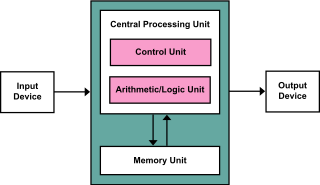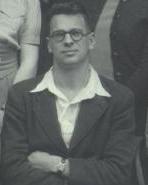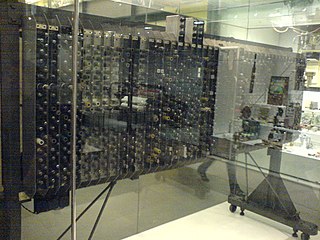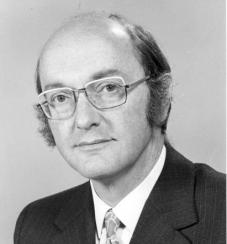
Alan Mathison Turing was an English mathematician, computer scientist, logician, cryptanalyst, philosopher and theoretical biologist. Turing was highly influential in the development of theoretical computer science, providing a formalisation of the concepts of algorithm and computation with the Turing machine, which can be considered a model of a general-purpose computer. He is widely considered to be the father of theoretical computer science and artificial intelligence.

The National Physical Laboratory (NPL) is the national measurement standards laboratory of the United Kingdom. It sets and maintains physical standards for British industry.

The von Neumann architecture—also known as the von Neumann model or Princeton architecture—is a computer architecture based on a 1945 description by John von Neumann, and by others, in the First Draft of a Report on the EDVAC. The document describes a design architecture for an electronic digital computer with these components:

The Manchester Baby, also called the Small-Scale Experimental Machine (SSEM), was the first electronic stored-program computer. It was built at the University of Manchester by Frederic C. Williams, Tom Kilburn, and Geoff Tootill, and ran its first program on 21 June 1948.

David John Wheeler FRS was a computer scientist and professor of computer science at the University of Cambridge.

The Pilot ACE was one of the first computers built in the United Kingdom. Built at the National Physical Laboratory (NPL) in the early 1950s, it was also one of the earliest general-purpose, stored-program computers – joining other UK designs like the Manchester Mark 1 and EDSAC of the same era. It was a preliminary version of the full ACE, which was designed by Alan Turing, who left NPL before the construction was completed.

Donald Watts Davies, was a Welsh computer scientist who was employed at the UK National Physical Laboratory (NPL).

Christopher S. Strachey was a British computer scientist. He was one of the founders of denotational semantics, and a pioneer in programming language design and computer time-sharing. He has also been credited as possibly being the first developer of a video game. He was a member of the Strachey family, prominent in government, arts, administration, and academia.

The Automatic Computing Engine (ACE) was a British early electronic serial stored-program computer design by Alan Turing. Turing completed the ambitious design in late 1945, having had experience in the years prior with the secret Colossus computer at Bletchley Park.
Brian Randell DSc FBCS FLSW is a British computer scientist, and emeritus professor at the School of Computing, Newcastle University, United Kingdom. He specialises in research into software fault tolerance and dependability, and is a noted authority on the early pre-1950 history of computing hardware.

Harry Douglas Huskey was an American computer design pioneer.

The history of computer science began long before the modern discipline of computer science, usually appearing in forms like mathematics or physics. Developments in previous centuries alluded to the discipline that we now know as computer science. This progression, from mechanical inventions and mathematical theories towards modern computer concepts and machines, led to the development of a major academic field, massive technological advancement across the Western world, and the basis of a massive worldwide trade and culture.

Joseph Henry Woodger was a British theoretical biologist and philosopher of biology whose attempts to make biological sciences more rigorous and empirical was significantly influential to the philosophy of biology in the twentieth century. Karl Popper, the prominent philosopher of science, claimed "Woodger... influenced and stimulated the evolution of the philosophy of science in Britain and in the United States as hardly anybody else".
John Ronald Womersley was a British mathematician and computer scientist who made important contributions to computer development, and hemodynamics. Nowadays he is principally remembered for his contribution to blood flow, fluid dynamics and the eponymous Womersley number, a dimensionless parameter characterising unsteady flow.

The NPL network, or NPL Data Communications Network, was a local area computer network operated by a team from the National Physical Laboratory (NPL) in London that pioneered the concept of packet switching.

The Turing Guide, written by Jack Copeland, Jonathan Bowen, Mark Sprevak, Robin Wilson, and others and published in 2017, is a book about the work and life of the British mathematician, philosopher, and early computer scientist, Alan Turing (1912–1954).

Turochamp is a chess program developed by Alan Turing and David Champernowne in 1948. It was created as part of research by the pair into computer science and machine learning. Turochamp is capable of playing an entire chess game against a human player at a low level of play by calculating all potential moves and all potential player moves in response, as well as some further moves it deems considerable. It then assigns point values to each game state, and selects the move resulting in the highest point value.
Roger Anthony Scantlebury is a British computer scientist who worked at the National Physical Laboratory (NPL) and later at Logica.















